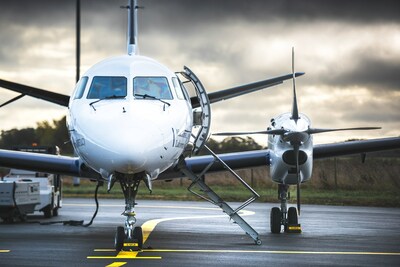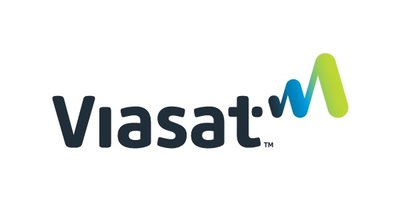Viasat has proven its precise UK Satellite Based Augmentation System (UK SBAS) aboard a test flight, as part of an ongoing trial funded by the Department for Transport through the European Space Agency.
LONDON, Jan. 18, 2024 /PRNewswire/ -- Viasat, Inc. (NASDAQ: VSAT) has demonstrated a UK satellite-based augmentation system (UK SBAS) for the first time, showing how highly accurate GPS data can maximize safety and improve efficiency.
The test flight, flown from Cranfield Airport using the National Flying Laboratory Centre's Saab 340B aircraft, showcased a UK-based SBAS that delivers more precise, reliable navigation data. The UK is no longer part of the EU's similar European Geostationary Navigation Overlay Service (EGNOS), following its exit from the European Union. While EGNOS can still be used for non-safety applications in the UK, the trial aims to provide a first step toward a complementary UK SBAS which can be used for critical safety of life navigation services across air, land, and sea.
UK SBAS works by combining ground monitoring data with satellite connectivity to provide more reliable navigational data. Across a range of applications, it can offer positioning down to a few centimeters of accuracy, rather than the few metres provided by standard GPS. For aviation, the system gives pilots greater trust in their onboard instruments, which has major implications when pilots may not be able to physically see a runway or other obstacles due to bad weather.
This means improved safety and fewer missed landings because pilots – especially smaller aircraft flying into regional airports and general aviation airfields – can get significantly closer to the ground during an approach before making the decision whether to land. Viasat's research with one regional flight operator indicated that close to 40% of flights cancelled due to weather could have gone ahead had UK SBAS been available for its fleet. Around the UK, 19 airports had EGNOS procedures in place prior to leaving the European Union. In total, as many as 72 airports no longer have access.
With the aviation test complete, the trial is aimed to test the system in other transport applications, for example for rail, uncrewed aerial vehicles, or autonomous road vehicles.
Technology Minister at the Department for Transport, Anthony Browne said "This successful demonstration illustrates the UK's first-class space sector, and our capabilities in position, navigation and timing specifically."
"The project, fully funded by Government through the ESA NAVISP programme, is directly supporting our work on future provision of high-accuracy, high-integrity positioning services, which could increase efficiency and enable new innovations across the transport network."
Todd McDonnell, President, International Government, Viasat, said "This trial on a sovereign UK SBAS is all about delivering trust. Trust for pilots in their tracking systems so they can stay safe in challenging conditions. Trust for the aviation industry more broadly so it can rely on data to operate more efficiently. And, in the future, trust that we can use highly accurate tracking to develop Britain's transport system as new technologies come into play. We're excited to continue the trial and see how far we can take it."
Dean Thomas, Position, Navigation and Timing Lead at the UK Space Agency, said "This testbed project is vital in helping Government understand the potential benefits of a UK SBAS. The flight trial both demonstrates the capability of UK industry in delivering space based PNT solutions and illustrates the benefits of delivering UK PNT projects facilitated by ESA, through the highly flexible NAVISP programme."
About the project
With funding from the Department for Transport via the European Space Agency's NAVISP programme, the trial is being completed by a Viasat-led team of companies in the UK, including Goonhilly Earth Station, CGI UK, GMV, Ordnance Survey, Cranfield University, the Cranfield National Flying Laboratory Centre, and Pildo Labs.
UK SBAS generates an overlay test signal to the US Global Positioning System (GPS), fully compliant with International Civil Aviation Organization (ICAO) standards, to enable assessment of more precise, resilient and high-integrity navigation for maritime and aviation users in UK waters and airspace. The signal is being broadcast in coordination with the US Federal Aviation Administration (FAA), the European Space Agency (ESA) and the European Union Space Programme Agency (EUSPA). Broadcast capability for UK SBAS is being provided by Viasat's I-3 F5 satellite.
A similar system, known as SouthPAN, is currently being developed to make resilient positioning, navigation and timing (PNT) available in Australia and New Zealand. Signals for the service would be provided by Viasat through one of its next-generation I-8 satellites, which are aimed to launch in 2027.
About Viasat
Viasat is a global communications company that believes everyone and everything in the world can be connected. With offices in 24 countries around the world, our mission shapes how consumers, businesses, governments and militaries around the world communicate and connect. Viasat is developing the ultimate global communications network to power high-quality, reliable, secure, affordable, fast connections to positively impact people's lives anywhere they are—on the ground, in the air or at sea, while building a sustainable future in space. On May 31, 2023, Viasat completed its acquisition of Inmarsat, combining the teams, technologies and resources of the two companies to create a new global communications partner. Learn more at www.viasat.com, the Viasat News Room or follow us on Facebook, Instagram, LinkedIn, X or YouTube.
Copyright © 2023 Viasat, Inc. All rights reserved. Viasat, the Viasat logo and the Viasat Signal are registered in the U.S and in other countries to Viasat, Inc. All other product or company names mentioned are used for identification purposes only and may be trademarks of their respective owners.
Forward-Looking Statements
This press release contains forward-looking statements that are subject to the safe harbors created under the Securities Act of 1933 and the Securities Exchange Act of 1934. Forward-looking statements include, among others, statements that refer to further funding and applications for UK SBAS and the future reliability of the I-3 F5 satellite or other Viasat satellites. Readers are cautioned that actual results could differ materially from those expressed in any forward-looking statements. Factors that could cause actual results to differ include: Further funding for the UK SBAS project, technological limitations on our ability to complete or prove the UK SBAS system in operation in aviation or other applications; applications for UK SBAS beyond those mentioned in the release; our ability to realize the anticipated benefits of the I-3 class satellites and any future satellite we may construct or acquire; unexpected expenses related to our satellite projects; our ability to successfully implement our business plan for our broadband services on our anticipated timeline or at all; capacity constraints in our business in the lead-up to the launch of services on our ViaSat-3 satellites; risks associated with the construction, launch and operation of satellites, including the effect of any anomaly, operational failure or degradation in satellite performance; our ability to successfully develop, introduce and sell new technologies, products and services; the effect of adverse regulatory changes (including changes affecting spectrum availability or permitted uses) on our ability to sell or deploy our products and services;; In addition, please refer to the risk factors contained in our SEC filings available at www.sec.gov, including our most recent Annual Report on Form 10-K and Quarterly Reports on Form 10-Q. Readers are cautioned not to place undue reliance on any forward-looking statements, which speak only as of the date on which they are made. We undertake no obligation to update or revise any forward-looking statements for any reason.
 View original content to download multimedia:https://www.prnewswire.com/news-releases/uk-sovereign-satellite-navigation-overlay-successfully-demonstrated-for-first-time-302038154.html
View original content to download multimedia:https://www.prnewswire.com/news-releases/uk-sovereign-satellite-navigation-overlay-successfully-demonstrated-for-first-time-302038154.html
SOURCE Viasat, Inc.
![]() View original content to download multimedia:https://www.prnewswire.com/news-releases/uk-sovereign-satellite-navigation-overlay-successfully-demonstrated-for-first-time-302038154.html
View original content to download multimedia:https://www.prnewswire.com/news-releases/uk-sovereign-satellite-navigation-overlay-successfully-demonstrated-for-first-time-302038154.html










